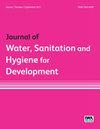Assessment of WASH infrastructure in schools in Central Sulawesi, Indonesia using structured observations and principal interviews
IF 1.4
4区 环境科学与生态学
Q3 WATER RESOURCES
Journal of Water Sanitation and Hygiene for Development
Pub Date : 2023-05-18
DOI:10.2166/washdev.2023.147
引用次数: 0
Abstract
Adequate water, sanitation, and hygiene(WASH) facilities in schools are vital, especially for girls. This study addresses a gap in assessing the adequacy of WASH facilities' repair at schools affected by natural hazards. Central Sulawesi was used as a case study where principal interviews were conducted at 26 schools, and structured observations were made at 18 schools, 3 years after the earthquake in September 2018. Of the 26 principals, 10 reported no damage to the toilets from the events of September 2018. Among those who reported damage, a third felt that the fixes insufficiently met basic needs and that they did not deliver WASH services as well as they used to. Structured observations revealed that most toilets lacked soap, open water reserves were placed next to non-flush latrines, posing a high potential for vector-breeding, and there were inadequate facilities for menstrual hygiene management, including no bins. Recommendations include ensuring a supply of soaps, adding lids to water storage containers for hygiene, and providing sanitary napkins and lidded bins. It was noted that private schools provided a better level of WASH service than state schools, and state schools in more hazardous zones did not take long to recover and offer lower-quality WASH facilities.利用结构化观察和校长访谈评估印度尼西亚中苏拉威西省学校的讲卫生基础设施
学校里充足的水、环境卫生和个人卫生设施至关重要,尤其是对女孩来说。这项研究解决了在评估受自然灾害影响的学校讲卫生设施维修的充分性方面存在的差距。中苏拉威西岛被用作案例研究,在2018年9月地震发生3年后,对26所学校进行了校长访谈,并对18所学校进行结构化观察。在26名校长中,有10人报告说,2018年9月的事件没有损坏厕所。在报告损坏的人中,三分之一的人认为修复措施不能满足基本需求,他们没有像过去那样提供讲卫生服务。结构性观察显示,大多数厕所缺乏肥皂,开放式水源被放置在非冲洗厕所旁边,很有可能滋生病媒,而且月经卫生管理设施不足,不包括垃圾箱。建议包括确保肥皂的供应,为储水容器添加卫生盖,以及提供卫生巾和带盖垃圾箱。有人指出,私立学校比公立学校提供了更好的讲卫生服务,而危险地区的公立学校很快就恢复了,并提供了质量较低的讲卫生设施。
本文章由计算机程序翻译,如有差异,请以英文原文为准。
求助全文
约1分钟内获得全文
求助全文
来源期刊

Journal of Water Sanitation and Hygiene for Development
WATER RESOURCES-
CiteScore
3.10
自引率
11.80%
发文量
58
审稿时长
16 weeks
期刊介绍:
The Journal of Water, Sanitation and Hygiene for Development is a peer-reviewed journal devoted to the dissemination of high-quality information on the science, policy and practice of drinking-water supply, sanitation and hygiene at local, national and international levels.
 求助内容:
求助内容: 应助结果提醒方式:
应助结果提醒方式:


